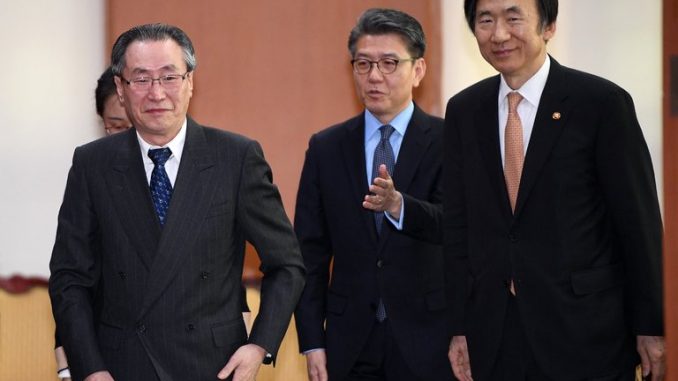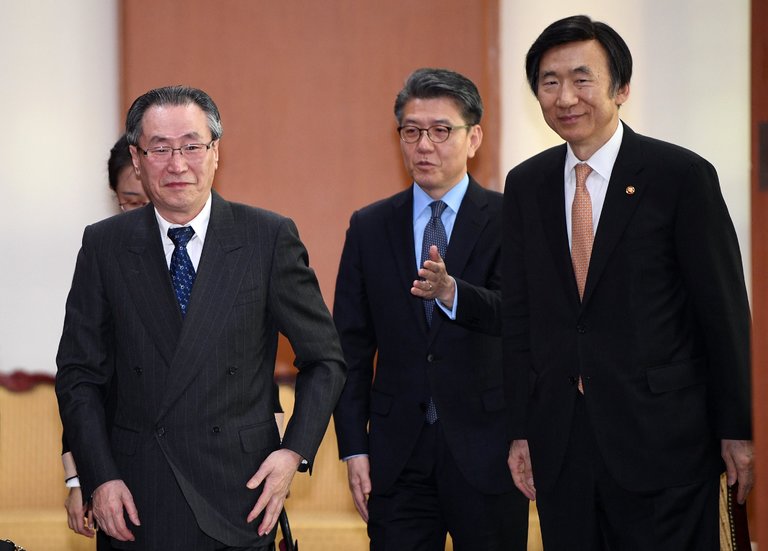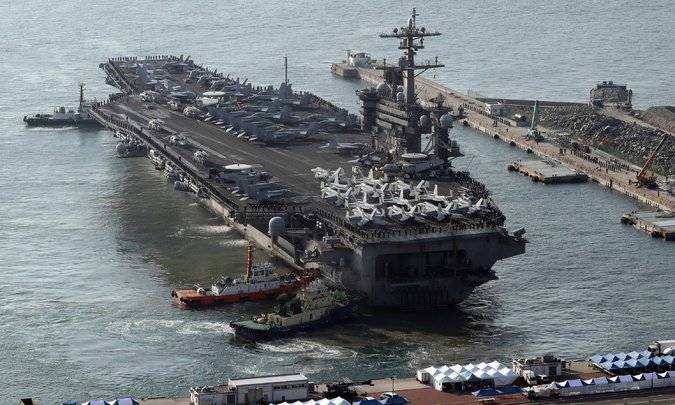
Article makes all main points & key details we’ve emphasized. “Show of US force conceals lack of better options for dealing with North Korea provocations. China president Xi Jinping did not make any public commitment to tighten the pressure on North Korea during his meeting with Trump. Even privately, officials said, he was circumspect. That leaves the White House in a bind on a security issue Trump has described as the most pressing of his presidency.” Having warned before the meeting with Xi the US would act alone against North Korea if China did not join his pressure campaign, Trump is now being exposed as a blustering paper tiger, whose warnings need not be taken seriously. Here, Wu Dawei, China’s special representative for Korean Peninsula Affairs, left, with his South Korean counterpart, Kim Hong-kyun, center, and Foreign Minister Yun Byung-se of South Korea, right, in Seoul, on Monday. N.B. TNT = Trump And Tillerson
“President Trump’s deployment of an aircraft carrier to the waters off the Korean Peninsula has raised tensions across East Asia.
But the show of American force conceals a lack of better options for dealing with the provocations of the rogue government in North Korea.
As we noted, China president Xi Jinping did not make any public commitment to tighten the pressure on North Korea during his meeting last week with Trump.
Even privately, officials said, he was circumspect — again, as we said.
An attack on North Korea carries far greater risk than the missile strike that Trump ordered last week
to punish President Bashar al-Assad of Syria for his deadly chemical weapons attack — again, a point we made.
That leaves the White House in a bind on a security issue Trump has described as the most pressing of his presidency.
Trump warned before the meeting with Xi the US would act alone against North Korea if China did not join his pressure campaign.
[ And since Xi clearly declined, TNT have put themselves, the US and our allies in East Asia in an incredibly weak and exposed position. ]
A senior administration official expressed hope the productive tone [ ??? ] of the meeting would eventually lead to further Chinese actions —
radically wishful thinking, especially given the fact that the “tone” of the meeting was hardly “productive”.
But Trump’s missile strike, which came while he and Xi were having dinner, could play both ways:
Administration officials said it would convince the Chinese leader of Mr. Trump’s resolve,
while some experts said it would reinforce fears in Beijing that he is erratic and unpredictable.
OR — and much more likely, as we have pointed out — it would make the Chinese realize TNT have ZERO idea about what to do,
and they can be easily out-maneuvered, as Xi has been doing since his refusal to deal with Trump after the Taiwan phone call debacle.
Flexing US military muscle alone is not likely to deter North Korea’s dictator, Kim Jong-un, from testing nuclear bombs and ballistic missiles — again, a point we have made several times.
Former President Barack Obama twice ordered the aircraft carrier George Washington into the Yellow Sea to intimidate Kim’s father, Kim Jong-il,
but it failed completely to persuade him to change his behavior.
“This is déjà vu all over again,” said Jeffrey A. Bader, who advised Obama on China.
“They’ve signaled a new approach, but they’re discovering that the new approaches are not particularly attractive.”
The White House is likely to pursue so-called secondary sanctions,
which target Chinese firms and banks that help North Korea earn foreign currency and finance its weapons programs.
The question is whether the Chinese government will cooperate with the effort — it won’t —
and [ when ] it does not, whether Trump will impose the sanctions unilaterally,
even at the risk of rupturing the relationship between Washington and Beijing.
On Sunday, Secretary of State Rex Tillerson — again, as we’ve said, a MOST unreliable witness, whose word we have NO reason to believe —
said Xi agreed with Trump that “the situation has intensified and has reached a certain level of threat that action has to be taken.”
Sorry, dudes, I’m just not buying Tillerson as any kind of credible source for anything, let alone Xi’s alleged state of mind.
China has taken modest steps to increase the pressure.
It agreed with South Korea on Monday to impose tougher sanctions on North Korea if it carries out nuclear or intercontinental ballistic missile tests, a senior South Korean diplomat said.
The announcement seemed intended to dissuade North Korea from conducting a test to mark a national holiday this week.
[ Yet the Times mentions nothing about China’s already having suspended all coal imports from North Korea, a vital source of foreign exchange for the Kim regime. ]
On Monday, Wu Dawei, the top Chinese envoy for international efforts to end North Korea’s nuclear weapons program,
met with his South Korean counterpart, Kim Hong-kyun, in Seoul, the South’s capital,
to discuss what to do about the North’s advancing nuclear and missile programs.
Kim said he and Wu did not discuss a possible American military strike against North Korea.
The US aircraft carrier Carl Vinson in Busan, South Korea, just last month. Anyone who thinks the return of the carrier group so soon will deter Kim Jong-un from doing anything is seriously deluding themselves.
In recent weeks, Trump’s aides warned that they were not ruling out “military options.”
Over the weekend, Tillerson said the US strike against Syria was a signal to other countries that “a response is likely to be undertaken” if they pose a danger.
Analysts and officials in South Korea fear that a pre-emptive military attack against North Korea —
even one limited to taking out nuclear and missile bases —
could set off a catastrophic retaliation and a full-scale war.
[ Again, a key point we have made many times. ]
Seoul lies within range of North Korean artillery and rockets amassed along the border.
Military planners in the Pentagon share those fears.
“While the military is very focused on maintaining a strong deterrence posture on the peninsula, it is acutely aware of the dangers of escalation,”
said Derek H. Chollet, a former assistant secretary of defense for international security affairs.
The risk of escalation in Syria was lower, Chollet said, because Assad is weaker than Kim,
and there is less concern about Syria’s stockpile of weapons of mass destruction falling into the wrong hands.
“A nuclear-armed North Korea is a different story,” he said.
In South Korea, the prospect of a pre-emptive strike has long been dismissed as unrealistic.
But “under President Trump, we are afraid that that may not necessarily be so anymore,”
said Cheong Seong-chang, an analyst at the Sejong Institute, a think tank in South Korea …
American allies in the region offered general support for deterrence — but not necessarily pre-emptive action.
In Japan, Prime Minister Shinzo Abe said he supported the “resolve” of the United States in stopping Syria from using chemical weapons.
But he did not directly comment on the move of the aircraft carrier to the region.
To South Koreans, Trump’s order to launch a barrage of missiles on Syria demonstrated his willingness to use military means against an adversary deemed particularly egregious.
And the order to the aircraft carrier Carl Vinson to return to waters near the Korean Peninsula appeared unusual
because it conducted exercises in the area last month.
Moon Sang-gyun, a spokesman for the South Korean Defense Ministry, said
the strike group was moving back to deter North Korean provocations in coming weeks.
North Korea observes major anniversaries this month,
including the April 15 birthday of its founder, Kim Il-sung, grandfather of Kim Jong-un,
raising fears that it might carry out celebratory weapons tests.
On Tuesday, North Korea lashed out at the US over the deployment of the aircraft carrier Carl Vinson.
The Korean Central News Agency quoted a Foreign Ministry spokesman as saying:
“We will hold the U.S. wholly accountable for the catastrophic consequences to be entailed by its outrageous actions.”
“The prevailing grave situation proves once again that the DPRK was entirely just when it increased in every way its military capabilities for self-defense and pre-emptive attack with a nuclear force as a pivot,” the agency report said.”
In other words, the US wouldn’t dare attack Assad if he had nuclear weapons.
Therefore, to the North Koreans, it only makes their drive for a nuclear capability all the more urgent —
a point we have made about North Korean thinking time and time again.
Source: Move of U.S. Warships Shows Trump Has Few Options on North Korea – The New York Times

